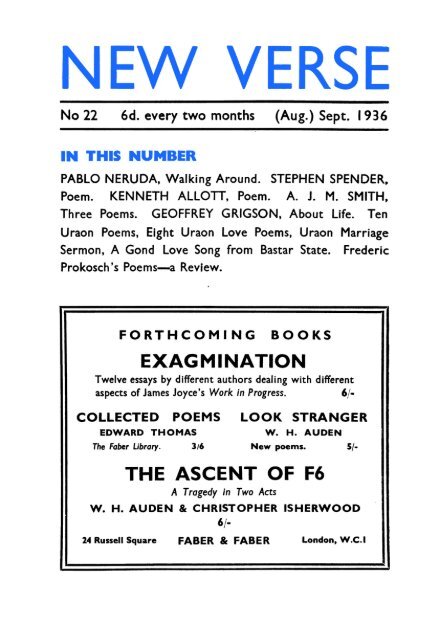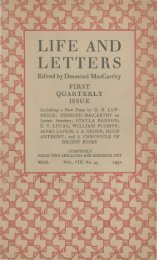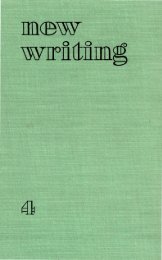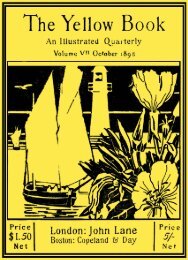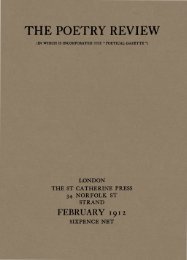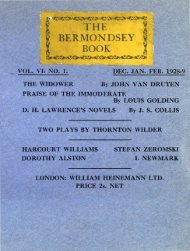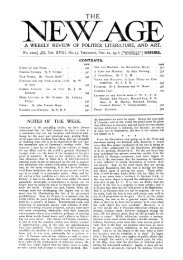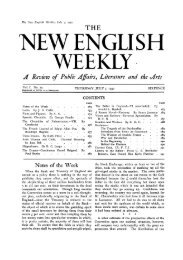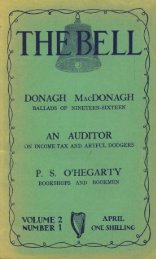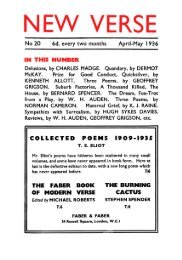Create successful ePaper yourself
Turn your PDF publications into a flip-book with our unique Google optimized e-Paper software.
NEW VERSE<br />
<strong>No</strong> <strong>22</strong> 6d. every two months (Aug.) Sept. 1936<br />
IN THIS NUMBER<br />
PABLO NERUDA, Walking Around. STEPHEN SPENDER,<br />
Poem. KENNETH ALLOTT, Poem. A. J. M. SMITH,<br />
Three Poems. GEOFFREY GRIGSON, About Life. Ten<br />
Uraon Poems, Eight Uraon Love Poems, Uraon Marriage<br />
Sermon, A Gond Love Song from Bastar State. Frederic<br />
Prokosch's Poems—a Review.<br />
FORTHCOMING BOOKS<br />
EXAGMINATION<br />
Twelve essays by different authors dealing with different<br />
aspects of James Joyce's Work in Progress. 6/-<br />
COLLECTED POEMS LOOK STRANGER<br />
EDWARD THOMAS<br />
W. H. AUDEN<br />
The Faber Library. 3/6 New poems. 5/-<br />
THE ASCENT OF F6<br />
A Tragedy in Two Acts<br />
W. H. AUDEN & CHRISTOPHER ISHERWOOD<br />
«/-<br />
24 Russell Square FABER & FABER London, W.C.I
WALKING AROUND<br />
Sometimes I get tired of being a man—<br />
when I go into the cinemas, the tailors' shops,<br />
heavy and faded like a flannel swan<br />
sailing a sea of beginnings and ashes.<br />
And the smell of the hairdresser's makes me cry with anguish ;<br />
all that I want is to lie down like wool, or like stones,<br />
all that I want is to see no buildings,<br />
no gardens, no elevators and no shop-windows.<br />
Sometimes I get tired of my feet and my nails,<br />
my skin and my shadow.<br />
Sometimes I get tired of being a man.<br />
And yet it would be delicious<br />
to threaten a lawyer with an arum lily,<br />
to do in an abbess with a box on the ears.<br />
It would be fine<br />
to go ranging the streets with a bright green knife<br />
uttering howls until one died of the cold.<br />
For I don't want to continue a root in the darkness,<br />
hesitating, stretched out, shivering in a dream<br />
—till the end below in the earth's dark entrails—<br />
absorbing, thinking, eating every day.<br />
I don't want as far as I'm concerned,<br />
I don't want such humiliations ;<br />
1 don't want to go on as a root, or a grave,<br />
or underground alone a cellar with the dead,<br />
stiffened, numbed, rotting with misery.<br />
And that is why Monday flares like petrol<br />
when it sees me advancing with my prison face,<br />
and screams in its passage like a wounded wheel,<br />
leaving at nightfall warm blood in its footsteps.<br />
And I am pushed into corners, into damp houses,<br />
into hospitals where bones fly out of windows,<br />
certain shoe-shops that reek of vinegar<br />
and streets terrible as abysses.<br />
2
Birds of sulphur-colour, horrible intestines<br />
hang from the doors of the houses that I hate ;<br />
dentures are lying forgotten in a coffee-pot;<br />
and mirrors,<br />
there are mirrors that must have wept with shame and with terror ;<br />
all around are umbrellas and poisons and navels.<br />
I pass by calmly ; with eyes ; with shoes ; raging ; or forgetting.<br />
I wander through offices and shops with surgical appliances,<br />
and courtyards where the clothes hang from the line,<br />
and where with their slow and dirty tears<br />
shirts, drawers and petticoats are weeping.<br />
PABLO NERUDA<br />
(English version by A. C. and Andrew Boyd.<br />
Neruda is the poet-laureate of Chili. He is at present in Madrid,<br />
as Chilian consul. His most substantial book of verse is " Residencia<br />
en la Tierra." 2 vols. Madrid 1935. Neruda does not count himself<br />
as a surrealist.)<br />
POEM<br />
If it were not too late !<br />
If I could mould my thought<br />
To the curved form of that woman<br />
With gleaming eyes, raven hair,<br />
Lips drawn too tight like a scar,<br />
Eye sockets shadowed with migraine's<br />
Memory of earlier loves and wars<br />
And her smile learned with being so human.<br />
I imagined her lying naked at night<br />
In warm rain when the breasts are watered<br />
Through darkness by reflecting drops of light,<br />
Which secret light accumulates<br />
In pools on the skin as though on fruit.
Then her light blue dress she unloosed<br />
Till light rose in rose and blue above the trees<br />
<strong>No</strong>t to expel sad dreams, but to shine<br />
On flesh that overflowed my eyes,<br />
On life locking the senses with closeness,<br />
0 dawn of all my certainties !<br />
If it were not too late.<br />
If I could still concentrate<br />
To clench my mind into a husk for love<br />
I'd be too hot and ripe for ghosts,<br />
Winds down side walks with swords of ice,<br />
All betraying lies and lights.<br />
For everything but she leads away<br />
By brambles and along mechanic lines<br />
To the suffering figures under trees<br />
Of heroes who have wrecked happiness<br />
And whose love is accomplished alone<br />
In a spasm on the outer surface of the brain.<br />
STEPHEN SPENDER<br />
POEM<br />
Birds are blown to the light, down come the wires<br />
the strayed ewe freezes to death on the empty fells ;<br />
thinlipped, raking a pick of fire<br />
the unforgiving are deafened by the new year peals ;<br />
true to the clock of frost the indecent spectre<br />
rules the four winds from a signpost, mocking the traveller<br />
running with his hands before him on a darkening moor.<br />
His voice which wrestles in the firs and mist<br />
turns to a new despair like a new^ fashion<br />
and chills an implacable bed of weeds and iron<br />
among the lenient shadows of the streams,<br />
the ghostly carrion which are wheeling where<br />
the uxurious streams rise like a full-moon frenzy<br />
of drowning lovers infesting a stranger's dreams<br />
as inalienable as moving air.<br />
His knotted hands are fortunes in the mist<br />
his blasphemies are flowers of the mist
the shadows of the dead as frequent as flies<br />
the rheumy dead who will not let you rest<br />
who fill your sleep with their cold inimical eyes.<br />
He walks your nightly precipice of sleep<br />
his anonymous tongue singing an epic of darkness<br />
of riders in the night across the moon,<br />
their angular shadows pitching into the storm,<br />
above the bleak and weary cottages<br />
where the soft candle dies in the hostile gloom<br />
and the children bury their heads in the clothes, in the darkness.<br />
Death as an ancient cross by an inland shore<br />
death the sophisticated district-visitor<br />
death as a rusty broken-ribbed umbrella<br />
death as a bright and poisonous miasma<br />
death as an icicle, death as an Ecce Homo<br />
the ring in cottonwool in the writing bureau<br />
death as the roar in a shell, a deck of cards<br />
the sea-troll screaming in the northern fiords<br />
death as the spiked embrace of the metal virgin<br />
death as a holy terror of breathing<br />
the invalid propped on his pillows, livid and panting<br />
the nerveless fingers blotting the unfinished sentence<br />
the old hound's failing sight, the unanswerable questions.<br />
His the bleached image in the abandoned well<br />
the luminous bead of destruction over marshes<br />
the remarkable sanctus of the stake and wheel<br />
the plural blight puffed on the glossy rushes ;<br />
he is there in a flash of lightning by the lych-gate<br />
the thunder reverberating down the inky lake.<br />
The sheen of treacherous sand, the salmon lights<br />
the moth in the silk of conscience, the savage future<br />
the judge's smile, the knuckle of rock in the straits<br />
the monsters moving round the silent crater
their hearts against their ribs, shadows on stilts<br />
fire-damp and fever, these are his signature.<br />
He saddens the sky, he stales the tidal water<br />
he is the vanishing-point of the long arcade<br />
he swells in the tragic dark outside your room<br />
a vast unfurnished dream of doubtful fate<br />
an active Roscius of general doom.<br />
KENNETH ALLOTT<br />
August 1936,<br />
ABOUT LIFE<br />
Wall-rue's busy growing high in the granite : mountain men<br />
In Karakoram also are busy with life, and are<br />
no more alone<br />
The close faces at the lighted end of the arch or the beetle<br />
Shoving a clay ball up the shale between the black<br />
of the mountains.<br />
Incidents of health all are mythical to the sick. <strong>No</strong>w stretched<br />
Over boarded panes of a broken house, a notice<br />
begging recruits,<br />
And lamps murder the moon, the dead king lies<br />
Under a lid, heart-failures vanish from cafe*s,<br />
mortuaries<br />
All are hidden, the living now don't pray with the dead:<br />
Yet can we live, O, ignoring these actions of death ? Incidents<br />
of health indeed<br />
Are mythical to the sick, but the tufted duck still drops<br />
On the scattered eyes of water in the wide scab<br />
of our houses,<br />
And certainly the smoke is most bitter in the nose<br />
Of the palled patients, travelling now in the slow trains<br />
to a surgeon.<br />
GEOFFREY GRIGSON
THE FACE<br />
The man with the acid face<br />
Under the hammer of glass<br />
Imperils the pure place.<br />
The emotion of the mass,<br />
Inverted, seems to ask<br />
The jack queen king and ace<br />
To do the task.<br />
Wait for a sure thing—<br />
Card into sleeve blown,<br />
Arm out of sling,<br />
Friends posted at phone ;<br />
Then when trumps are declared<br />
And partner's strength known<br />
Overpower the guard.<br />
But keep the face mum<br />
Till the right minute come.<br />
Look left and look right:<br />
Whose hand will you bite<br />
With the safest delight ?<br />
Whose safe will you crack<br />
With a pat on the back ?<br />
Replace the slave state face<br />
With a face of bread :<br />
Each shall choose his place,<br />
Be Dead, or Red.<br />
The cards are no way stacked<br />
And he may live by grace<br />
Who wills to act.<br />
A. J. M. SMITH
CHORUS<br />
Moveless, unmoved, caught in the dead face,<br />
The torches make a slow wound on the gray mist,<br />
A ragged circle the color of fox fur.<br />
Sharp beak and still, translucent water kiss :<br />
Wry lips, dank hair, taut throat, and marble eyes<br />
Mix in the pulpy salt of foam, and hiss.<br />
Knifethrust of silver, sunlight on fishscales,<br />
Waves out of the bay's bound, to ! <strong>No</strong>w the new wind<br />
Wafts Iphigenia to Aulis, bellies our creaking sails.<br />
A. J. M. SMITH<br />
NOCTAMBULE<br />
Under the flag of this pneumatic moon<br />
Blown up to bursting, whitewashed white<br />
And painted like the moon, the piracies of day<br />
Scuttle the crank hulk of witless night.<br />
The great black innocent Othello of a thing<br />
Is undone by the nice clean pockethandkerchief<br />
Of 6 a.m., and though the moon is only an old<br />
Wetwash snotrag—horsemeat for good rosbif-—<br />
Perhaps to utilise substitutes is what<br />
The age has to teach us.<br />
Wherefor let the loud<br />
Unmeaning warcry of treacherous daytime<br />
Issue like whispers of love in the moonlight<br />
—Poxy old cheat !<br />
So mewed the lion,<br />
Until mouse roared once and after lashed<br />
His tail: shellshock came on again, his skin<br />
Twitched in the rancid margarine, his eye<br />
Like a lake isle in a florist's window,<br />
Reality at two removes, and mouse and moon<br />
Successful.<br />
A. J. M. SMITH
TEN URAON POEMS<br />
1. Whose is the blue grove where the koels are going ?<br />
It is the blue grove of the rajah which the koels are filling.<br />
2. On a kend pole a dhichua sits<br />
In the paddy fields a parrot swoops and wheels<br />
Like today the dhichua sits<br />
Like yesterday a parrot swoops and wheels<br />
On a kend pole the dhichua sits<br />
In the paddy fields a parrot swoops and wheels.<br />
3. Under the peepal tree the black cows are sitting<br />
A heron sits in the peepal tree<br />
Who was the girl who broke a branch<br />
And sent the sitting heron flying from the tree ?<br />
4. At Bassia's spring<br />
The kewar grove is planted<br />
0 rider come and pick the blossom<br />
In the planted grove.<br />
5. The Thakur sits in a tufted chair<br />
Gold are the legs and silk the strings<br />
The Thakur sits in a tufted chair.<br />
6. The deer barks in the four sections of the night<br />
Jungly boy, where is the abandoned calf?<br />
The infant calf<br />
Jungly boy, where is the abandoned calf ?<br />
7. Before the windows and the doors<br />
Lakho Mahto rides his horse<br />
Winner of renown in the rajah's house<br />
Before the windows and the doors<br />
Lakho Mahto rides his horse.<br />
8. The tiny tamarind<br />
A shining shelter<br />
Hare haire
Come, my gallant, to the spring<br />
And I shall dash your clothes with water<br />
Hare haire<br />
9. Very small the mahua<br />
Many the branches<br />
On all sides falling<br />
Hare haire<br />
10. Image, image, image, Babu<br />
Image of a face with hair<br />
Oh when were they carved the eight parts ?<br />
Of the father its creation<br />
Of the mother was its birth<br />
Out of the future were the eight parts.<br />
EIGHT URAON MARRIAGE POEMS<br />
10<br />
1. The brown dove coos in the different hills<br />
Dove, my mother is not here, I cannot sleep<br />
Dove, my father is not here, I cannot sleep.<br />
2. The dove, the dove<br />
Calls in the hills, the hills<br />
I have no mother and I cannot sleep<br />
I have no father and I cannot sleep<br />
3. Under the hills<br />
From the clear springs the water flows<br />
Water that the doves sip and the pigeons drink<br />
In pairs they have come down the swans<br />
In pairs they have come down<br />
<strong>No</strong>. It is not the swans. It is not the doves.<br />
It is the girl the elder brother chose.<br />
4. The fawns frolic in the ploughed fields<br />
<strong>No</strong>. It is not the sambur. It is not the barking deer.<br />
This is the girl selected by the father<br />
The bride chosen by the mother.
5. Mother, in Kidili jungle<br />
Alone I wander<br />
The cock has crowed<br />
It is the point of morning.<br />
6. Mother my darling, father my darling<br />
The blue flag of the mother<br />
Is stolen by a band<br />
Is lost to a gang<br />
Scour the villages<br />
Scour the villages<br />
0 mahtos and bandaris<br />
Thikedars and subedars<br />
The blue flag of the mother<br />
Is stolen by a band<br />
Is lost to a gang.<br />
7. The deer graze on the slopes<br />
The deer graze on the slopes<br />
The deer graze<br />
The fish sport in the pools<br />
The fish sport in the pools<br />
The fish sport<br />
The bride sits in the mother's lap<br />
The bride sits on the father's knees<br />
The bridegroom catches fish<br />
The bride jumps in the corners<br />
Jumps, holding herself with glee, in the corners.<br />
8. The bright and shining flutes<br />
My brother has released the cattle<br />
He fights with the bees, he fences with the bees<br />
You, flute, must go to your mother<br />
You, flute will go to your father in law<br />
In the four quarters of the night will your sleep come ?<br />
Flute, can your sleep come ?<br />
II
URAON MARRIAGE SERMON<br />
1. I shall speak in riddles. In an ebony bush it looks to the<br />
sky. God is above and the elders are below.<br />
Attend, boy and girl.<br />
2. Imagine you are out for hunting, boy, and you kill a deer.<br />
You will bring it home and the girl will cook it. When she has<br />
cooked it, she will cut it up. But mark. For all others, she must<br />
serve the flesh on a tiny tamarind leaf; but for herself, she must<br />
take it from a large korkot leaf.<br />
3. Attend again. When the bull is killed for meat, girl, you<br />
must insist on having the flesh, on having only flesh—nothing else.<br />
The boy will have the bones, nothing more than bones.<br />
4. Then again. When on a hunting expedition, he slips in a<br />
ditch, laming his leg and losing the use of his fingers, never say,<br />
never say he has become a wreck.<br />
5. And listen, boy. If your girl, going to pick leaves from the<br />
koenar tree, falls from a branch and breaks an arm or a leg, you<br />
must never say she has become useless. Oh do not tell her she<br />
has lost the use of her hands.<br />
6. As the fig tree gives many fruits, so you will have your children.<br />
7. Rise and salute the elders.<br />
«<br />
(English by W. G. Archer and Edward Kujar.<br />
The Uraons are an Indian people parallel in many ways to the<br />
Gonds—see the note to the next poem—though their cultures and image<br />
systems are different and the regions in which they live are separate.<br />
They are alike in having the same kind of agricultural background, an<br />
isolation based on the jungle, a necessity for dancing, a freedom from<br />
Hindu and Mussalman convention, and the same type of aboriginal<br />
sensibility.)<br />
12
CHAIT-PARAB SONG<br />
FROM JAGDALPUR ^TAHSIL, BASTAR STATE<br />
Woman : I bow to the three worlds, to the sun and the moon up<br />
above,<br />
And to the goddess of the earth Danteshwari.<br />
Man : O my sweet rose, I have sprinkled water on the back<br />
Of our Mother Danteshwari, and scattered parched rice<br />
And put lights in front of her.<br />
Woman : Our Mother Danteshwari, shining with bangles and<br />
bracelets,<br />
Sat on her throne. This was her order : Let my beloved<br />
Princess, the Babi Dhani, swing on her royal chariot.<br />
Man : Re, re, in our Jagdalpur there are hundreds of goddesses.<br />
I will offer only one cock to them, I will offer them flowers<br />
And betel leaves and parched rice.<br />
Woman : O you sweet wreathe of flowers of my heart, copper<br />
mines<br />
Abound in old Bastar and Jagdalpur. If a bee entered<br />
me,<br />
My body would find it cool and pleasant. My darling,<br />
You cannot know how sweet the orange is till you taste it.<br />
Man : I have sat by you hopefully, my beloved. I am looking<br />
round<br />
For a fruit I can eat before it is ripe. Have I found it<br />
in you ?<br />
Give it to me now, while I still hope to find it,<br />
For I shall never get it at my home<br />
Woman : 0 my dear, you have toddy and cocoanut palms in your<br />
garden.<br />
I have only grass now in mine. Choose another time when<br />
the<br />
Fruit is sweet and ripe.<br />
Man : 0 my sweetheart, with graceful locks of hair on your<br />
head,<br />
A pitcher in your hand, where is your home ? I will<br />
come<br />
When I have supped. Give me just a little<br />
And I will not try to eat all.<br />
13
Woman : Sedges and wild rice grow where water stands, grass<br />
Grows on the level ground. If you want to eat,<br />
Then come to my home at Kharakgh&t.<br />
Man : The coppersmith makes mattocks of bronze, the carpenter<br />
Makes wooden seats. At this moment of hunger and thirst<br />
I have run to you with a tooth-stick in my loin-cloth.<br />
O darling, favour me now I have come. I might not<br />
Find you at night.<br />
Woman : You have made a dam with your spade, but water<br />
Leaks through and escapes. Where would you be off to<br />
From my arms ? O my dear, I would beat you<br />
If you tried to escape.<br />
Man : I had grown fourteen sweet gourds, and their smell<br />
Was delicious. Sweetheart, there is no sin in a man<br />
Who returns a woman when he's enjoyed her.<br />
But I will not lose sight of you, even if I go<br />
To kill a rat in that house.<br />
Woman : The tree is as tall as a mountain, but the leaves<br />
Are tiny. I do not ask money from you, I do not ask<br />
Piles of cowries. I ask only for love. It is only for love<br />
I tangled myself with you. Without your love,<br />
I shall have lost my name for nothing.<br />
Man : At a price you would give the rose that's as red<br />
As the highway gravel and the basket of green bamboos<br />
To all who want them, but you do not ask a thing<br />
For quenching the thirst of my passion. Certainly a<br />
woman<br />
Finds joy in a man, and they tumble together during the<br />
night.<br />
Woman : O my dear, you have toddy and cocoanut palms in your<br />
garden.<br />
I have only nuts in mine, which are ripe and falling fast,<br />
Since no parrot comes to enjoy them. And you, only<br />
wealth<br />
Of my heart, will not enjoy them,<br />
Thinking you must buy them with money.<br />
Man : Sweet and scented flower wreathe of my heart, does not<br />
The breath of the wind shake the leaves and the rivers ?<br />
When he drinks, the parrot with the red head<br />
Dives again and again !<br />
14
Woman : We store the paddy in the wicker bin, the busker<br />
Is kept in the corner. We cannot eat it all by ourselves,<br />
You come as well, and take all that you need.<br />
[This song is translated from a Halbi original, sung by Murias and<br />
Bhattras in villages around Jagdalpur, the capital of the large and<br />
little-known Bastar State, in the extreme south-east of tlie Central<br />
Provinces. Murias and Bhattras are of Gond affinities. Most<br />
Murias still speak a Gondi dialect, but in the plains around Jagdalpur,<br />
where they are most in contact with hinduizing influences, especially<br />
that of the palace, Halbi, a mixture of Hindi, Marathi, Uriya and<br />
Gondi, is steadily replacing Gondi, and Hindu ideas are influencing<br />
the primitive tribal religions. This song is one sung by dancing<br />
parties of youths and girls at the spring festival in the month of Chait,<br />
which precedes the sowing of the rice. It is erotic, like nearly all their<br />
songs. DantSshwarl (Stanza 1) is tutelary goddess of Bastar. Babl<br />
Dhdnl (Stanza 3) was the affectionate name by which the people of<br />
Bastar called the late Maharani Prafulla Kumari Devi, of Bastar.<br />
At the Chaitrai spring festival or at the Dasehra festival in October<br />
the Ruler of Bastar sits in a swing on a processional rath or chariot,<br />
which is dragged around a square in front of the palace at Jagdalpur<br />
by hundreds ofMuria and Maria Gonds.<br />
w< v QRIQSON<br />
"HONEST DOUBT"<br />
Owing to illness, the authoritative answers which were promised<br />
to the questions about Surrealism, published in the last number<br />
of NEW VERSE under the heading of ** Honest Doubt," must<br />
be postponed to a later issue.<br />
Meanwhile we would draw readers to examine the International<br />
Surrealist Bulletin <strong>No</strong>. 4 (Zwemmer, 1 shilling) issued by the<br />
Surrealist Group in England. Most of it is plain and simple exposition,<br />
though so much goosefoot as there is among the signatories<br />
does not make one very sure about the militant honesty and good<br />
sense of the Group promoters. Surrealists at least should be able<br />
to recognise the weeds of literary adventure.<br />
<strong>No</strong>te also that Mr. H. R. has at length retired from the pedantic<br />
pill-box of SUPER-REALISM.<br />
15
BUY THIS BOOK<br />
The Assassins. By Frederic Prokosch. (Chatto and Windus.<br />
5s.)<br />
Every active maker or sharer of an attitude is now obsessed<br />
with the quick arrival of the Doomsday of human culture. Things<br />
are all threatened, Mr. Auden and the Archbishop of Canterbury<br />
would agree, but the Established Archbishop reads Berdyaev,<br />
deplores Communism, dreads a shrinking of Christendom, and puts<br />
his hope in God, while Mr. Auden reads Lenin, deplores Fascism,<br />
dreads attacks on Communism, and puts his hope in Marx, Freud<br />
and, so to speak, Matthias Alexander. Nearly every writer, every<br />
thinker, every poet of worth stands (whether Mr. Wyndham Lewis<br />
and Mr. Yeats and Mr. E. like it or not) nearer to Mr. Auden than<br />
to the Archbishop in this matter; but in between Mr. Auden and<br />
the half-way line there certainly are such poets as Mr. MacNeice<br />
and Mr. Prokosch. Either through a weakness, a caution or a<br />
wisdom, they are readier to observe than to observe and dispense.<br />
All Mr. Prokosch's best poems are statements or myths of decay.<br />
He observes " the white Death of stagnant centuries" the people<br />
who live in death such as<br />
the sisters who alone<br />
Shed tears and on the entry of the Countess<br />
Like owls rise and are gone.<br />
Stating that he sees u the forgotten honour of my human Race hinted<br />
at once more" he tells nothing about how we should act, but<br />
perhaps much about how we should feel, for the second mark of<br />
Mr. Prokosch's poems is a remarkable tenderness—" / can see veins<br />
in the dark flesh of the world "—" the English Deep in their moist<br />
nocturnal island "—young lovers lying " in inexperienced postures,"<br />
a tenderness over human relationships and over the length of<br />
human history which is now ending.<br />
So, also, Mr. Prokosch's way of writing is rather sensuous and<br />
feminine. He is not tough like Mr. Auden, or sharp like Mr.<br />
MacNeice, and though he writes with several changes of pattern,<br />
he is not very dexterous in varying form or sound. One Prokosch<br />
poem is usually more effective than 2 or 3 read consecutively in a<br />
book, and though his poems mostly come from one attitude, what<br />
16
EPILOGUE: a twice-yearly Critical Review<br />
Editor: 7 is Associate Editor:<br />
LAURA RIDING //O ROBERT GRAVES<br />
VOL. II (SUMMER 1936)<br />
CONTENTS : The Exercise of English—Philosophy and Poetry—<br />
Crime—Homiletic Studies—Lucretius and Jeans—Bull-Fighting—<br />
George Sand, and various other pieces.<br />
CONVALESCENT CONVERSATIONS<br />
by MADELEINE VARA 5/-<br />
A book of informal dialogue between two intelligent invalids bent<br />
on not falling in love.<br />
ALMOST FORGOTTEN GERMANY<br />
by George Schwarz. Translated by<br />
LAURA RIDING and ROBERT GRAVES 7/6<br />
Times "Literary Supplement: " This is a strange, but interesting, if<br />
rather cynical, book. Its chief value is in the picture of life half a<br />
century ago in a small German community. There are no complaints<br />
or excuses and there is no moralizing. It is this perhaps that gives the<br />
book its unusual character. It is frank and honest, and there runs<br />
through it a genuine appreciation for beautiful things."<br />
• 10 Orange Street, London, W.C.2-<br />
they say is really different enough to demand more variation. The<br />
almost single tone and feminine speed with which they run make<br />
them more inactive, more smooth, more slick than they should<br />
be. This enervate flow of light syllables may come out of Mr.<br />
Prokosch's nature, but nature can be criticised by its owner.<br />
And Mr. Prokosch's writing has these virtues : he never goes too<br />
far from common into used-up speech (though poeticisms such as<br />
" vigilant and proud " " our passionate and forever Unregenerate<br />
speech " are boring and can be left for Paul Engle and the other<br />
posturing rhetoricians of the U.S.), he does not pick up, for no<br />
good reason, too much from others (though there are dying falls<br />
from Mr. Macleish and balancing adjectives—" the stare at the<br />
extended arms on the tender bed " — and anthropological and<br />
mythical mannerisms from Mr. Auden), he is not often syntactically<br />
obscure. So much of these poems, in sum, is Mr. Prokosch's own<br />
property that it will be disappointing if his talent does not take<br />
him much higher than most of the English or American chickweeds.<br />
17
NELSON<br />
TWO NEW CENTAUR POETS<br />
I nrcc Old Selected<br />
Brothers<br />
AND OTHER POEMS<br />
FRANK O'CONNOR<br />
Poems<br />
WILFRED ROWLAND<br />
CHILDE<br />
2s 6d net<br />
3s 6d net<br />
THE FIRST TWO CENTAUR POETS<br />
Fieldfaring<br />
The End of the Road<br />
STANLEY SNAITH MARGARET CROPPER<br />
2s 6d net<br />
3S 6d net<br />
LEARNING POETRY<br />
" I have read with great interest the letter in your paper on<br />
4 reading and speaking poetry.' For many years I have made it<br />
a practice to learn some every day during my morning toilet.<br />
They give me almost an inspiration for the day, and often unconsciously<br />
I am helped through them to express myself in ordinary<br />
conversation in a way that I should not be able to do otherwise.<br />
Just now I am going through Milton's ode on his blindness. I<br />
venture to quote a few of his lines:—<br />
18<br />
So much the rather Thou Celestial light<br />
Shine inward and the mind through all her powers<br />
Irradiate: there plant eyes, all mist from thence<br />
Purge and disperse, that I may see and tell<br />
Of things invisible to mortal sight."<br />
CONSTANCE ROWE<br />
Letter to THE TIMES
THE<br />
SPEECH INSTITUTE<br />
Chairman :<br />
Marjorie Gull an<br />
A Series of Lectures on<br />
MODERNIST<br />
POETRY<br />
will be given by<br />
E. W. F. TOMLIN<br />
at the Speech Institute,<br />
56 Gordon Square, W.G.I<br />
FROM OCT. 8th<br />
Write Secretary for Particulars.<br />
DEUTSCHER<br />
LESEKREIS<br />
• A German Reading Circle is<br />
being formed, and a general<br />
leaflet with information will be<br />
sent out on request. There will<br />
be evenings reserved for<br />
German poetry. The organizer<br />
hopes to be able to accept<br />
readers of New Verse at a fee<br />
of one shilling an evening<br />
during September.<br />
• Apt>ly for leaflet or interview by<br />
letter only, mentioning New Verse.<br />
OR. HERMANN WALDE<br />
43. GLOUCESTER TERRACE<br />
LANCASTER GATE - W. 2<br />
SPARE PARTS<br />
" . . . my senses are like those of primitive peoples, at once acute<br />
and uncovered—and they are interchangeable."<br />
THE OLD JANE<br />
BACK NUMBERS<br />
Numbers 1, 2, 3, 4, 5 and 14 (Gerard Manley Hopkins number)<br />
can no longer be supplied.<br />
All communications to 4A KEATS GROVE, LONDON, N.W. 3.<br />
Manuscripts, for loss of which no responsibility can be taken,<br />
cannot be returned unless they are accompanied by an addressed<br />
envelope, stamped or with an international reply coupon.<br />
The annual subscription to NEW VERSE is 3s. 6d. (or for Canada<br />
and America 1 dollar). Single numbers will be sent for Id. to any<br />
part of the world.<br />
Payment is made for all contributions in verse.<br />
19
CONTEMPORARY POETRY<br />
AND PROSE<br />
Numbers 4 & 5 are now ready, published together as<br />
a double number<br />
SIX POEMS by PABLO PICASSO<br />
and other contributions by<br />
ANDRE BRETON, SALVADOR DALI,<br />
HUMPHREY JENNINGS, KENNETH<br />
ALLOTT, E. E. CUMMINGS, GAVIN<br />
EWART, DYLAN THOMAS, DAVID<br />
GASCOYNE, GEORGE BARKER,<br />
BENJAMIN PERET, EDGAR FOXALL,<br />
B. H. GUTTERIDGE<br />
PRICE ONE SHILLING<br />
Edited by Roger Roughton, at 1<br />
Parton St., W.C.1<br />
Distribution :<br />
Stanley <strong>No</strong>tt Ltd., 69 Grafton St., Fitzroy Sq., W.C.1<br />
Yearly subscription (including double numbers), 7/-, post free.<br />
U.S.A., $1.75; France, Fr. 30.<br />
NEW VERSE is published by FRANCES FRANKLIN GRIGSON at 4A Keats Grove,<br />
London, N.W. 8, and printed by BILLING AND SONS LTD., Guildford and Esher.


